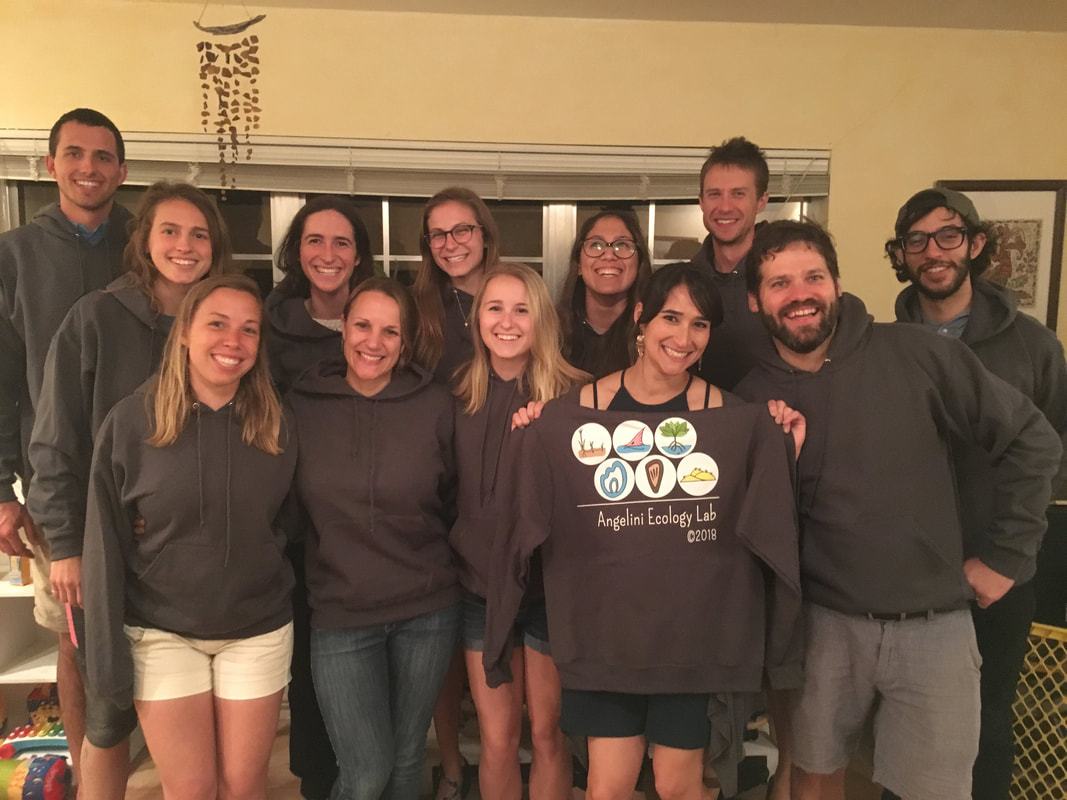Meet the Angelini lab
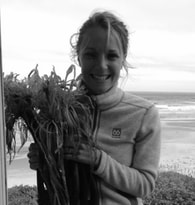
Christine Angelini
I am an Assistant Professor in Environmental Engineering Sciences at the University of Florida. Fascinated with nature and alarmed by the degradation of natural systems, I pursued an education in ecology and conservation as an undergraduate at Brown University, where I received my BSc in Marine Biology in 2007. After four years of researching invaded and degraded brackish and salt marshes along the New England coast under the mentorship of Mark Bertness, I moved south to further develop my skill set in experimental community and conservation ecology as a PhD student under Brian Silliman at the University of Florida.
Working in salt marshes, maritime forests, coastal hammocks, and oak savannas across the southeastern US, my dissertation research explored how interactions among foundation species drive patterns in biodiversity, ecosystem functioning, and resilience from the local patch to larger landscape scale.
Since starting my current position as a tenure-accruing professor at UF in 2014, I have started new research focused on: the role of habitat-modifying organisms in shaping marine and terrestrial food webs and contaminant fate and transport; cost-effective and durable approaches to restoring degraded oyster reefs, sand dunes and salt marshes; mechanisms of ecosystem recovery from disturbance; and the effects of top predator expansion on nearshore ecosystem structure and function, as well as a number of other community and conservation ecology related topics. Please see my CV for additional details.
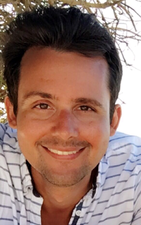
Miles Medina
Miles Medina joined the Angelini Lab and Center for Coastal Solutions as a postdoctoral research fellow in April 2021 to work on interdisciplinary, multisector collaborative research investigating the spatiotemporal dynamics and drivers of coastal algae blooms in Florida. Previously, as a quantitative consultant, he worked with various government entities and developed data management and machine learning tools to identify sources of water quality impairments throughout Florida. Miles completed his PhD in 2019 with a thesis on inferring causality in complex ecohydrological systems, including treatment wetlands in the Everglades and red tide blooms off Florida’s Gulf Coast.
Contact: [email protected]
Miles Medina joined the Angelini Lab and Center for Coastal Solutions as a postdoctoral research fellow in April 2021 to work on interdisciplinary, multisector collaborative research investigating the spatiotemporal dynamics and drivers of coastal algae blooms in Florida. Previously, as a quantitative consultant, he worked with various government entities and developed data management and machine learning tools to identify sources of water quality impairments throughout Florida. Miles completed his PhD in 2019 with a thesis on inferring causality in complex ecohydrological systems, including treatment wetlands in the Everglades and red tide blooms off Florida’s Gulf Coast.
Contact: [email protected]
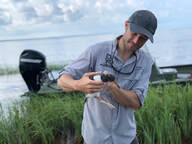
Joe Marchionno
Joe is a PhD student in Environmental Engineering Sciences and a former conservation biologist for The Florida Fish and Wildlife Conservation Commission Research Institute. His research will focus on restoring offshore oyster reefs and barrier islands to benefit imperiled shorebirds and seabirds. His work will be conducted with The Florida Fish and Wildlife Conservation Commission in the Lower Suwannee and Cedar Keys National Wildlife Refuge.
Contact: [email protected]
Joe is a PhD student in Environmental Engineering Sciences and a former conservation biologist for The Florida Fish and Wildlife Conservation Commission Research Institute. His research will focus on restoring offshore oyster reefs and barrier islands to benefit imperiled shorebirds and seabirds. His work will be conducted with The Florida Fish and Wildlife Conservation Commission in the Lower Suwannee and Cedar Keys National Wildlife Refuge.
Contact: [email protected]
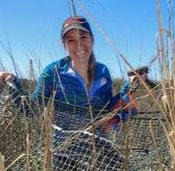
Julie Walker
Julie is a PhD student in Interdisciplinary Ecology in the School of Natural Resources and Environment and joined the lab in Fall 2016. She is a Bridging the Americas PhD Fellow and is evaluating how the northern migration of mangroves and tropicalization of nektonic predators is altering predator-prey dynamics in salt marshes. Email: [email protected]
Julie is a PhD student in Interdisciplinary Ecology in the School of Natural Resources and Environment and joined the lab in Fall 2016. She is a Bridging the Americas PhD Fellow and is evaluating how the northern migration of mangroves and tropicalization of nektonic predators is altering predator-prey dynamics in salt marshes. Email: [email protected]
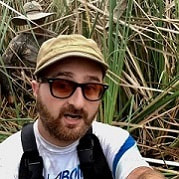
Stefano Barchiesi
Stefano joined the lab in Fall 2018 after being admitted as a PhD student in Interdisciplinary Ecology in the School of Natural Resources and Environment. He is a UF Water Institute Graduate Fellow and his research focuses on how evaluating the ecological integrity and related ecosystem services of the Palo Verde wetlands in Costa Rica can contribute to their restoration. Contact: [email protected]
Stefano joined the lab in Fall 2018 after being admitted as a PhD student in Interdisciplinary Ecology in the School of Natural Resources and Environment. He is a UF Water Institute Graduate Fellow and his research focuses on how evaluating the ecological integrity and related ecosystem services of the Palo Verde wetlands in Costa Rica can contribute to their restoration. Contact: [email protected]
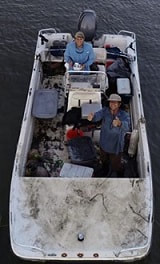
Collin Ortals
Collin is a second year PhD student in the Coastal Engineering department. He joined the Angelini lab in Spring 2019. He is interested in the interactions between crabs and mussels, vegetation, and morpho-hydrodynamics in salt marshes and how these interactions are being modified by sea level rise. His work is largely focused on salt marshes distributed across the SE US eastern seaboard.
Contact: [email protected]
Collin is a second year PhD student in the Coastal Engineering department. He joined the Angelini lab in Spring 2019. He is interested in the interactions between crabs and mussels, vegetation, and morpho-hydrodynamics in salt marshes and how these interactions are being modified by sea level rise. His work is largely focused on salt marshes distributed across the SE US eastern seaboard.
Contact: [email protected]
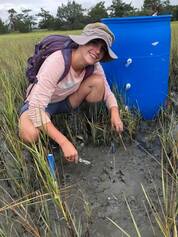
Sydney Williams
Sydney is a first year PhD student in Environmental Engineering Sciences. She is broadly
interested in ecosystem service valuation and restoration ecology of salt marshes.
Her current research focuses on characterizing the role ribbed mussels play in facilitating
biogeochemical fluxes on both a localized and landscape scale and how restoration of
bivalve populations can be utilized in management to address cultural eutrophication in
coastal communities.
Contact: [email protected]
Sydney is a first year PhD student in Environmental Engineering Sciences. She is broadly
interested in ecosystem service valuation and restoration ecology of salt marshes.
Her current research focuses on characterizing the role ribbed mussels play in facilitating
biogeochemical fluxes on both a localized and landscape scale and how restoration of
bivalve populations can be utilized in management to address cultural eutrophication in
coastal communities.
Contact: [email protected]
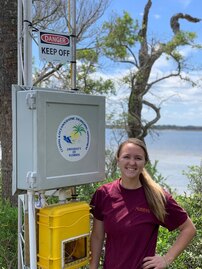
Lauren Brisley
Lauren is a first year PhD student in the Coastal Engineering department. She is studying boat traffic in the highly traversed Intracoastal Waterway through a solar powered video monitoring system to understand the interactions between boat wakes and coastal ecosystems. Lauren is working with the Naval Research Laboratory to explore image analysis with the goal of creating a framework to automate data collection from video. Lauren's work is currently located at the Guana Tolomata Matanzas National Estuarine Research Reserve (GTMNERR) near St. Augustine, Florida.
Contact: [email protected]
Lauren is a first year PhD student in the Coastal Engineering department. She is studying boat traffic in the highly traversed Intracoastal Waterway through a solar powered video monitoring system to understand the interactions between boat wakes and coastal ecosystems. Lauren is working with the Naval Research Laboratory to explore image analysis with the goal of creating a framework to automate data collection from video. Lauren's work is currently located at the Guana Tolomata Matanzas National Estuarine Research Reserve (GTMNERR) near St. Augustine, Florida.
Contact: [email protected]
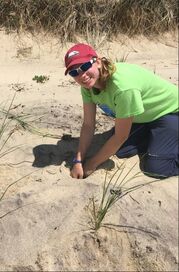
Hallie Fischman
Hallie is a first year PhD student in the Coastal Engineering department. She first joined the lab as an undergraduate where she worked on salt marsh and sand dune restoration projects. As a PhD student, Hallie is building on her undergraduate work in sand dunes. She is currently studying how mutualistic interactions can be used to enhance sand dune restoration. Hallie is also part of an ongoing project tracking sand dune erosion, recovery, and resilience to storms.
Contact: [email protected]
